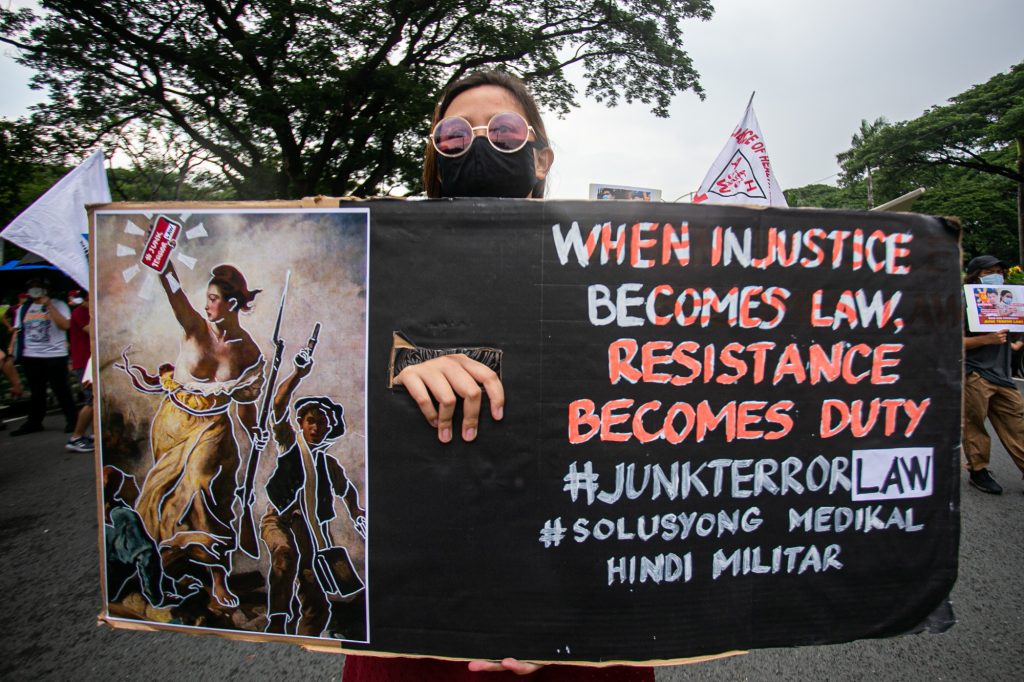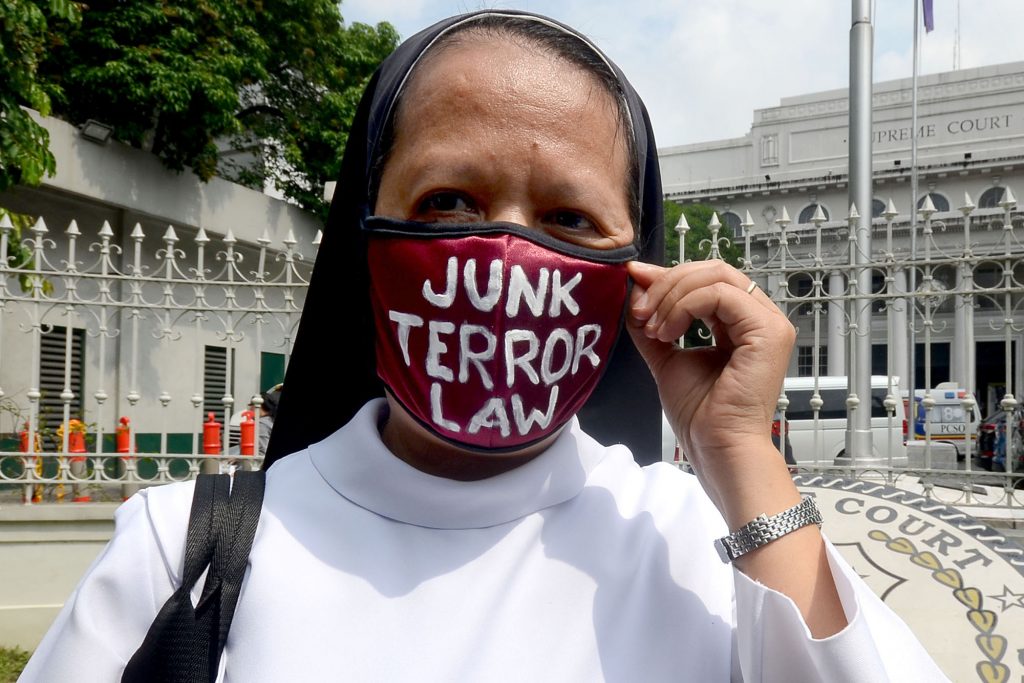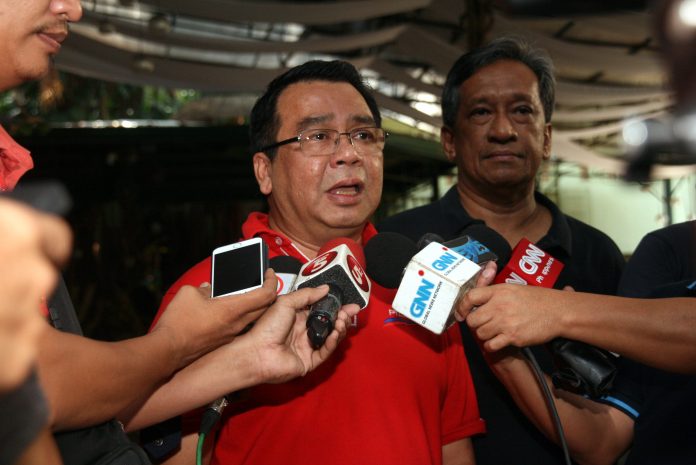Not by any spring and stretch am I a lawyer.
I wouldn’t know an oral argument from mouthwash. Nor can I spot the subtle weaves and corkscrews in legalese. There are experts in this field and, recently, they brought their oral arguments against the draconian and largely ambiguous Anti-Terrorism Law into court.
One of those who stood in opposition to this law was Neri Colmenares. I have read and had been told many a good thing about this man. Seeing and hearing him at work to defend the rights of Filipinos did not disappoint.
During his presentation on the Cluster 4 issues, barring all the legalistic somersaults, Colmenares dove into the Terror Law without flinching:
“A basic principle of a democratic system,” he said, “is that where the rights of the individual are concerned, the end does not justify the means. It is not enough that there be a valid objective; it is also necessary that the means employed to pursue it be in keeping with the Constitution. Mere expediency will not excuse constitutional shortcuts.
He further pounds on the principle that “No one should go to prison for the exercise of constitutional rights. This terror law has done precisely that. That is why this abomination that pretends to be a law to protect the people must be struck down.”
I’m impressed at how he articulated his understanding of government’s responsibility in the implementation of our laws. “It is time to bring back sanity and restore reason. We must do the right things for the right reasons in the right way by the right persons at the right time.”
Allow me to repeat that: We must do the right things for the right reasons in the right way by the right persons at the right time.
That, folks, is Colmenares’ political version of Einstein’s Theory of Relativity, relativity being the basic idea of how everything must respond to a gravitational center, that center being what is right in deed, thought, and motivation.
This is what he proposes as the building block of good governance: Having the right people doing the right thing the right way for the right reasons at the right time. Anything short of this puts the State not only in a compromised position, but on that base where its motives will always be questioned.
In brief, I refuse to trust the Terror Law on account that I cannot trust the regime tasked to implement it. In my mind it’s as simple as that.
And, for the sake of argument, even if the said ambiguities in the law do not exist, that it’s perfect to the last drop, I will remain insistent that the said law is abusive and draconian for the simple reason that the government tasked to implement the said law remains abusive and draconian.

Law and government share a kind of symbiotic relationship. One can hardly exist or function without the other. Unless there’s a machinery to implement it, a law is at best ink on paper.
Likewise, a State pruned of the power to draft and approve laws is nothing more than a soiree and a bingo club for the nothing-to-do.
Together, however, they form a formidable tripartite institution—Executive, Legislative, Judicial—working for the well-being of its constituents.
Any overreach of State powers for whatever lofty objective compels government to cease as a political institution. Instead, it metamorphoses into a criminal mob complete with a big boss, his minions and assassins—and a whole slew of victims in its wake.
This latter transfiguration is what bothers me. For in our sundry discussions about terrorism and how to defeat it, why is there no mention of the possibility of the State being the terrorist? Aren’t the claims of history sufficient proof that this can happen?
Let me explain.
The Terror Law is a product of four years of testing the waters, re: how far this regime can bend, even break, and totally disembowel the country’s laws as regards due process, the Bill of Rights, and everything pertaining to the well-being and protection of the citizen under the Constitution.
Think drug war. Think red-tagging and the communist scare. Think student crackdowns. Think militarization of the Covid-19 response.
What this regime has done with the Anti-Terror Law is shift the imputation of criminal intent and liability from government solely to the citizen—exclusively and without question, as though the very same government doesn’t have what it takes to sow terror.
The presumption that government is always innocent in any discussion of terrorism, that it is, by and large, the country’s protector and not the people’s enemy regardless of its actions, is to turn a blind eye to what has transpired in the last four years.
In all our debates, two questions have yet to be raised: What if the government is the terrorist? And, what if the law supposedly designed to curb terrorism is the very weapon being used to sow terror?

The narrative that only those outside of government (leftist organizations, student groups, human rights organizations, environmental activists, etc.) can think of and do a terrorist act is seriously flawed in the least, lethal at best.
History has said much to prove otherwise, what with all the wherewithal, machinery and armed forces at the State’s beck and call.
In a court of law, the prove intention is crucial to maintaining either innocence or guilt, that I know. Be that as it may, the last four years have given even the ordinary citizen a front-row seat as to what this regime is capable of doing.
Colmenares pointed this out in his argument: “The personalities targeted by these members of the ATC [Anti-Terrorism Council] engaged in terrorist tagging are opposition legislators, human rights defenders, bishops, priests, a UN special rapporteur, prominent lawyers, and celebrities who are perceived to be opposing actions of public officials who can dish it out but cannot take it. Even those who criticize the “anti-terror” law, including the petitioners and lawyers in this case, have become victims of terrorist tagging. Many activists and dissenters, mostly in the provinces, have died while being served by the police with search warrants many of which were issued by judges in Metro Manila on a formulaic narrative of ‘nanlaban.’”
If the last four years are not sufficient to prove government’s intentions of sowing terror in order to curb dissent, I don’t know what will.
As a writer, I find the Anti-Terrorism Council’s power to impute guilt outside of due process utterly appalling. Colmenares takes this case and shreds it for all to see:
“A person exercising a right through artistic expressions today would suddenly be committing a crime tomorrow upon the mere imputation that such expression was intended to create a serious risk to public safety.”
For the past four years, the Duterte administration has done most everything to eviscerate the Constitution, our penal laws, and the Bill of Rights. It has now subjected the 1987 Constitution to another terror, that of amendments to economic provisions, an act which opens other provisions, including term limits, to the risk of modifications.
Colmenares’ political version of the Theory of Relativity builds an open-and-shut case for the people’s rights. Yet it is my hope that he and the other lawyers would take it further, right into the very crux of the problem: that the Anti-Terrorism Law is, in and by itself, the terrorist, one implemented by a regime dead set on quelling dissent and expanding its powers.
It’s the right thing to do by the right persons at the right time for the right reasons.
Joel Pablo Salud is an editor, journalist and the author of several books of fiction and political nonfiction. The views and opinions expressed in this article are those of the author and do not necessarily reflect the official editorial position of LiCAS.news.









